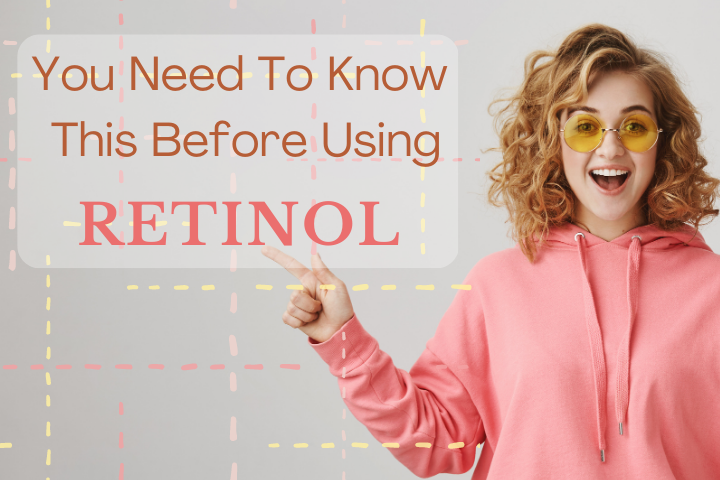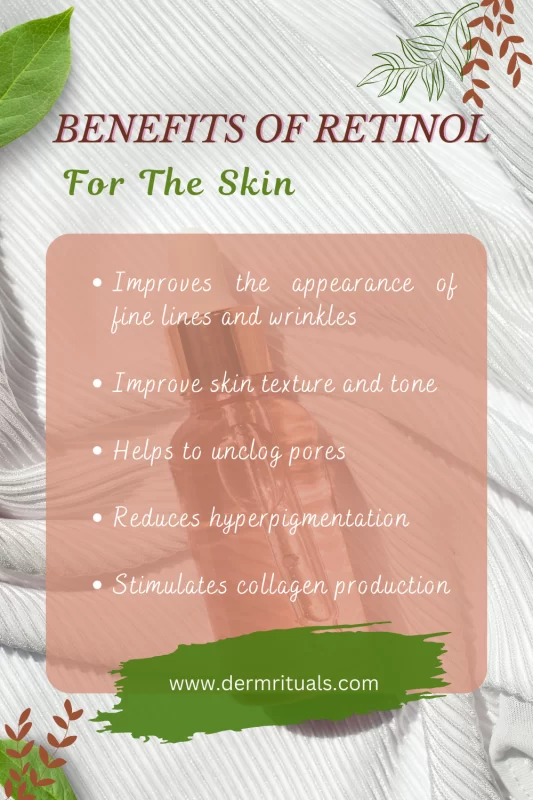Things You Need To Know Before Using Retinol (Vitamin A)

Vitamin A or Retinol is one of my favorite ingredients in skincare. This ingredient is the one that covers almost all the common. skin problems. Retinol is best to be used by the age of 22 and above. It is known as the go-to anti-aging ingredient.
What Is Retinol:
Retinol is a form of Vitamin A that has been used in skincare for decades. It is a powerful ingredient that improves the appearance of fine lines, wrinkles, and uneven skin tone. It can also unclog pores and reduce breakouts, making it a great skincare ingredient for both anti-aging and acne-prone skin. Retinol is available in a variety of over-the-counter products, as well as prescription strength formulas. Prescriptions of Vitamin A are more effective and strong.
Vitamin A is naturally present in our body, but over time as we start to age, our body’s Vitamin A production slows down, here is when the topical form of Vitamin A (Retinol) comes into play. Itis a popular ingredient in skincare these days and known for its anti-aging and acne-fighting properties.
How Retinol Works:
Retinol works by penetrating the outer layers of the skin and binding to specific receptors in the skin cells. This triggers a cascade of events at a cellular level that leads to increased collagen production, cell turnover, and improved skin tone and texture. Additionally, retinol can unclog pores and decrease the amount of oil production in the skin, leading to fewer breakouts.
Types Of Retinols:
There are several different forms of Retinol available, each with its own set of benefits and drawbacks. Over-the-counter products typically contain lower concentrations of Retinol, whereas prescription-strength formulas will have a higher concentration.
Additionally, some products use a “time-released” form of Retinol, which allows for a slower release of the ingredient into the skin. This can be beneficial for those with sensitive skin, as it can help to reduce the likelihood of irritation.
Other forms of retinoids like Retin-A, Tretinoin, Tazorac and others are stronger forms of retinoids that are only available by prescription. They are most often prescribed to target more severe cases of acne, fine lines, and wrinkles, as well as other skin concerns.
Benefits Of Using Retinol:

Retinol can help to improve the overall appearance of the skin by stimulating collagen production, which can lead to a reduction in fine lines and wrinkles. It also promotes cell turnover, which can improve skin texture and tone.
Additionally, Retinol can unclog pores and reduce the likelihood of breakouts, making it a popular choice for those with acne-prone skin. It can also help to improve the appearance of hyperpigmentation and age spots, making it an effective ingredient for overall brightening and evening of skin tone.
Here are some benefits of retinol in detail.
1- Improves the appearance of fine lines and wrinkles:
Retinol works by stimulating collagen production in the skin, which can lead to a reduction in fine lines and wrinkles. As we age, collagen production slows down, which can cause the skin to appear less firm and youthful. By using a product that contains Retinol, you can help to boost collagen production and improve the appearance of fine lines and wrinkles.
2- Improve skin texture and tone:
Retinol promotes cell turnover, which means that it helps to shed dead skin cells on the surface of the skin and bring new, healthy cells to the surface. This can help to improve the overall texture and tone of the skin, making it appear smoother and more even. Additionally, retinol can also stimulate elastin production, which improves skin elasticity and firmness.
3- Helps to unclog pores:
Retinol can also help to unclog pores by decreasing the amount of oil that is produced in the skin. This can lead to fewer breakouts and a reduction in the appearance of existing blemishes. Retinol can also help to decrease inflammation in the skin, which can further reduce the likelihood of breakouts.
4- Stimulates collagen production:
Retinol’s ability to stimulate collagen production is one of its key benefits. Collagen is a protein that gives the skin its firmness and elasticity. As we age, collagen production decreases, which can cause the skin to lose its firmness and appear less youthful. By using a product that contains Retinol, you can help to stimulate collagen production and improve the overall firmness and elasticity of the skin. This can lead to a more youthful, radiant appearance and improved skin health.
5- Reduces Hyperpigmentation:
This is my favorite part of using retinol. It gets rid of almost all kinds of hyperpigmentation. Retinol can reduce age spots, acne spots, and scars and also help to reduce sun spots. It exfoliates the top layer of our skin gently and brings out new skin that is pigmentation free.
How To Use Retinol The Right Way:
Retinol can be very irritating for some skin types. You need to know how to properly use retinol to reap its benefits.
1- When to incorporate Retinol into your skincare routine:
Retinol is a powerful ingredient and should be introduced to your skincare routine gradually. It’s usually recommended to start using it a couple of times a week, before increasing frequency and application amount as the skin gets used to it. It’s best to use it at night as Retinol makes the skin more sensitive to sunlight and it’s also important to wear sunscreen during the day when using retinol.
2- Introduce Retinol gradually:
It is important to start by using a lower concentration of Retinol and to use it only a few times a week. Gradually increase the frequency of use as your skin becomes accustomed to it. If your skin is sensitive, it’s also a good idea to apply a moisturizer after using Retinol to reduce the risk of skin irritation.
To minimize the risk of irritation, it’s important to start by using a lower concentration of Retinol and to use it only a few times a week. Gradually increase the frequency of use as your skin becomes accustomed to it. It’s also a good idea to apply a moisturizer after using Retinol to reduce the risk of irritation.
3- How to use Retinol effectively:
For best results, it’s important to use Retinol consistently and to be patient when waiting for results. It’s also important to use a high-quality product that is formulated with the right concentration of Retinol for your skin. Additionally, using Retinol in combination with other anti-aging ingredients, such as Vitamin C or hyaluronic acid, can enhance its effectiveness. But Do not start using everything at once, your skin gradually builds up a tolerance for these potent ingredients.
4- Avoid exfoliating ingredients:
Retinol can be used in conjunction with other skincare products, but it’s important to be mindful of the potential for irritation. A good rule of thumb is to use Retinol first, followed by a moisturizer and then an SPF. It’s also important to avoid using other exfoliating ingredients such as AHA or BHA when using retinol as they can increase irritation.
5- Retinol product storage:
Retinol is a light-sensitive ingredient, so it’s important to store it in a cool, dry place, away from direct sunlight. Additionally, it’s important to use a product that is formulated with an airtight pump or dropper, as this can help to preserve the potency of the Retinol. It’s also a good idea to make sure that the product is not expired and in case you notice any discoloration or change in smell, it’s best to discard it.
Side Effects Of Retinol:
Retinol is a powerful ingredient that can be effective in improving the appearance of the skin, but it can also cause some side effects that you should study. Take some precautions before adding retinol to your skincare routine.
Some of the most common side effects of using retinol include:
1- Dryness:
Retinol can cause dryness and flaking of the skin, especially in the first few weeks of use. It is best to use a thick moisturizer when starting out with retinol to protect the skin from drying out. This dryness is short-lived and will eventually go away if you are consistently using retinol.
2- Redness and irritation:
Some people may experience redness, itching, or a burning sensation when using retinol, especially if they have sensitive skin or if they are using a high concentration of the ingredient. Always start out with lower concentrations and slowly build-up a tolerance to high concentrations.
3- Sun sensitivity:
Retinol makes the skin more sensitive to sunlight, so it’s important to use sunscreen when using retinol-based products, especially during the day. If you skin sunscreen while using retinol then you are doing more damage to your skin than ever.
Retinol + Sun damage = Pigmentation + Redness
Read more on importance of SPF: You Will Never Skip Sunscreen After Reading This
4- Breakouts:
Some people may experience initial breakouts or purging when they start using retinol, as the ingredient can cause the skin to push out trapped oil and impurities. If you keep using retinol these breakouts will eventually go away.
It is also important to note that while these side effects can happen, they can often be reduced by gradually introducing the product to your routine, using a moisturizer, and avoid mixing retinol with other strong ingredients.
To Conclude:
- Retinol can help to improve the overall appearance of the skin by stimulating collagen production
- Although getting clear skin with retinol takes time and consistency but it is totally worth it.
- Some people may be more sensitive to retinol than others.
- It’s best to start with a lower concentration of the ingredient and to use it only once a week.
- It’s always a good idea to patch-test the product before applying it to the entire face.
- Read more about Retinol: How Does Retinol Work on the Skin?


